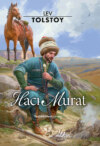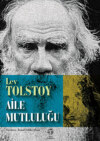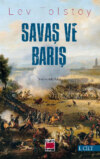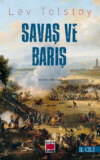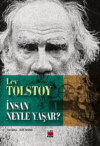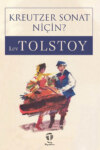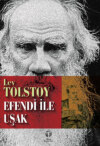Kitabı oku: «Tolstoi for the young. Select tales from Tolstoi», sayfa 6
VI
Life was very hard for them now. Their shackles were never removed, and they were never allowed out into the fresh air. Raw dough was thrown down to them, as one throws a scrap to a dog, and water was let down in a jug. The stench in the pit was awful and it was damp as well. Kostilin grew quite ill; he swelled very much and every bone in his body ached. He either groaned or slept all the time. Jilin, too, was depressed; he saw that their position was hopeless and did not know how to get out of it.
He tried to make a tunnel but there was nowhere to throw the earth, and when the master saw it, he threatened to kill him.
One day when he was most downcast, squatting in the pit and thinking of his freedom, a cake fell from above, then another, and some cherries rained down. Jilin looked up and saw Dina. She looked at him, laughed and ran away.
“I wonder if Dina would help us?” Jilin thought.
He cleared a space in the pit, dug a little clay and began to make some dolls. He moulded some men and horses and dogs, thinking, “When Dina comes, I will throw these up to her.”
But Dina did not come the next day. Jilin heard a stamping of horses; some Tartars seemed to have come and all gathered at the Mosque, shouting and arguing. It was something about the Russians. The voice of the old man was heard, too. Jilin could not understand all they said, but he made out that the Russians were near, that the Tartars were afraid of them and did not know what to do with their prisoners.
After a while they dispersed. Suddenly Jilin heard a rustling overhead and saw Dina crouching at the edge of the pit, her knees higher than her head. She bent over so that the coins at the end of her plaits dangled over the pit. Her eyes were twinkling like two stars. From her sleeve she took two cakes made of cheese and threw them down to him. Jilin picked them up and said, “What a long time it is since you’ve been to see me! I’ve made you some toys. Look, here they are!” He threw them up to her one by one. She shook her head and averted her gaze. “I don’t want them, Ivan,” she said. “They want to kill you, Ivan,” she added, pointing to her throat.
“Who wants to kill me?”
“My father. The old man told him to, but I’m sorry for you.”
Jilin said, “If you are sorry for me, bring me a long pole.”
She shook her head, as much as to say that it was impossible.
He put up his hands and implored her, “Please, Dina! Be a dear and bring it!”
“I can’t,” she said; “they’ll catch me at home.” Then she went away.
In the evening Jilin sat in the pit wondering what would happen. He kept looking up; the stars were visible, but the moon had not yet risen. The Mullah’s call was heard, and all grew quiet. Jilin began to doze, thinking “The child is afraid.” Suddenly some clay dropped on to his head. He looked up, and saw a long pole poking into the opposite wall of the pit; it began to slide down. Jilin took hold of it and lowered it with a feeling of gladness at his heart. It was a stout, strong pole; he had noticed it many times on the roof of the master’s hut.
He looked up. The stars were shining high in the sky and above the pit Dina’s eyes gleamed in the darkness like a cat’s. She leant her head over the pit and whispered, “Ivan, Ivan!” making signs to him to speak low.
“What is it?” Jilin asked.
“They’ve all gone but two.”
“Come, Kostilin,” Jilin said; “let us try our luck for the last time; I’ll help you up.”
But Kostilin would not listen to him.
“No,” he said; “it seems that I can’t get away from here. How can I come when I’ve hardly strength enough to move?”
“Well, good-bye, then. Don’t think ill of me.”
He kissed Kostilin, and seizing the pole, he asked Dina to hold it at the top and swarmed up. Twice he fell back again; the shackles hindered him. But Jilin persevered and got to the top somehow. Dina clutched hold of his shirt and pulled at him with all her might, unable to control her laughter.
When he clambered out Jilin handed her the pole, saying, “Put it back in its place, Dina, for if they notice its absence they’ll beat you.”
Dina dragged the pole away, and Jilin went down the hill. When he got to the bottom he sat down under its shelter, took a sharp stone and tried to wrench the lock off the shackles. But the lock was a strong one and would not give way, and it was difficult to get at it. Suddenly he heard some one coming downhill, skipping lightly. “It must be Dina again,” he thought.
She came up, took the stone and said, “Let me try.”
She knelt down and tried to wrench the lock off, but her little hands were as slender as little twigs and there was no strength in them. She threw the stone down and burst into tears. Jilin made another attempt, while Dina squatted down beside him and put her hand on his shoulder.
Jilin looked round; to the left the sky was all red; the moon was beginning to rise. “I must cross the valley and be under shelter of the wood before the moon rises,” he thought. He got up and threw away the stone. “I must go as I am in the shackles. Good-bye, Dina, dear; I shall always remember you.”
Dina seized hold of him and groped about his coat with her hand to find a place to thrust some cakes into. Jilin took the cakes.
“Thank you, little one,” he said. “There won’t be any one to make you dolls when I am gone.” He stroked her head.
Dina burst into tears and, covering her face with her hands, she fled up the hill, bounding along like a wild goat. The coins in her plait could be heard jingling in the darkness.
Jilin crossed himself, took the lock of his shackles in his hand to prevent a clatter and started on his way, dragging his shackled leg and gazing at the red in the sky where the moon was rising. This time he knew the way. He had to go straight on for six miles. If only he could reach the wood before the moon had quite risen! He forded the river. The red light over the hill had paled. He walked along the valley, looking back now and then; the moon was not yet visible. The light grew brighter and brighter; one side of the valley was quite light. The shadows crept along the foot of the hill, drawing nearer to him.
Jilin kept in the shadow. He hurried, but the moon moved faster than he; the hilltops on the right were already lit up. As he neared the wood, the moon rose over the hills, all white, and it grew as light as day. All the leaves on the trees could be seen distinctly. It was still and light on the hills; there was a dead silence, except for the murmur of the river below.
He reached the wood without meeting any one. He chose a dark spot and sat down to rest.
When he had rested a while and eaten a cake, he found a stone and once more tried to wrench the lock of the shackles. He cut his hands, but could not manage it. He rose and went on his way. After a mile he was quite worn out and his feet ached terribly. At every dozen steps or so he stopped. “It can’t be helped,” he thought. “I must drag myself on so long as my strength holds out, for if I once sit down I shan’t be able to get up again. I can’t reach the fortress to-night, that is obvious; as soon as it gets light I’ll hide in the wood and go on again when it gets dark.”
He walked the whole night, meeting only two Tartars, but Jilin heard them from a distance and took refuge behind a tree.
The moon began to pale; the dew fell; it was near dawn, but Jilin had not yet reached the end of the wood. “I’ll walk another thirty steps or so then I’ll creep into the thicket and sit down,” he thought. He covered the thirty steps and saw that he had come to the edge of the wood. When he came out it was quite light. Before him stretched the steppe and to the left, near the foot of a hill, he saw a dying fire from which the smoke rose and men were sitting about it.
He looked intently; there was a flash of guns – they were soldiers, Cossacks!
Jilin was overjoyed. He summoned his remaining strength and began to descend the hill, thinking, “God forbid that any mounted Tartar should see me now in the open field; though near my own people, I could not escape.”
The thought had no sooner crossed his mind than he saw three Tartars standing on a hill, not more than a few yards away. They had seen him and dashed down towards him. His heart gave a great bound. He waved his arms and shouted with all his might, “Help, help, brothers!”
The soldiers heard him; a few Cossacks sprang upon their horses and dashed forward to cut across the Tartars’ path.
The Cossacks were far off and the Tartars were near, but Jilin made one last effort; lifting the shackles with his hand, he ran towards the Cossacks. He hardly knew what he was doing and crossed himself wildly, crying, “Help, brothers, help!”
The Cossacks numbered about fifteen.
The Tartars grew afraid and stopped in hesitation before they reached him. Jilin managed to get to the Cossacks. They surrounded him, asking who he was and where he came from, but Jilin was quite beside himself and could only repeat, through his tears, “Brothers, brothers!”
The soldiers came up and crowded round him, one giving him bread, another porridge, another some vodka to drink, another gave him his cloak to cover him, and another wrenched off the shackles.
The officers recognized him and took him to the fortress. His men were delighted to see him; his fellow-officers gathered about him.
Jilin told them all that had happened to him and ended by saying, “That’s how I went home and got married. I wasn’t meant to marry, evidently.”
And Jilin remained in the army in the Caucasus. It was not until a month later that Kostilin was released, after paying a ransom of five thousand roubles. He was brought back in a half-dead condition.
EMELIAN AND THE EMPTY DRUM
Emelian was a labourer and worked for a master. He was walking through a field one day on his way to work, when a frog hopped in front of him and he just missed crushing it by stepping across. Suddenly some one called to him from behind. He turned, and there stood a beautiful maiden, who said to him, “Why don’t you marry, Emelian?”
“How can I, dear maiden? I possess nothing but the clothes I stand up in, and who would have a husband like that?”
“Marry me,” the maiden said.
Emelian looked at her in admiration.
“I would with pleasure,” he said, “but how should we live?”
“What a thing to trouble about, indeed!” the maiden said. “One has only to work the more and sleep the less and one can always be clothed and fed.”
“Very well; let us marry, then,” Emelian said. “Where shall we live?”
“In the town.”
Emelian and the maiden went to the town. She took him to a little house on the very edge and they married and set up housekeeping.
One day the King went for a drive beyond the town, and when passing Emelian’s gate, Emelian’s wife came out to look at him. When the King saw her he marvelled.
“What a beauty!” he thought. He stopped the carriage and called her to him.
“Who are you?” he asked.
“Emelian the peasant’s wife.”
“How came a beauty like you to marry a peasant?” he asked. “You should have been a queen.”
“Thank you for your kind words,” she said; “a peasant husband is good enough for me.”
The King talked to her a while and went on his way. When he returned to the palace Emelian’s wife did not go out of his head for a moment. The whole night he could not sleep and kept on thinking how he could take her away from Emelian, but no possible way occurred to him. He summoned his servants and asked them to think of a way.
And the servants said to him, “Get Emelian to come and be a labourer in the palace. We will wear him out with work, then his wife will become a widow and you can have her.”
The King followed their advice. He sent a messenger to tell Emelian that he was to come and be a yard-porter in the palace and bring his wife to live with him there.
The messenger came to Emelian and repeated the King’s words. And Emelian’s wife said to her husband, “It can’t be helped; you must go. You can work there in the day and return to me at night.”
Emelian went away. When he came to the palace the King’s steward said to him, “Why have you come without your wife?”
“Why should I drag her about with me? She has a home of her own.”
In the King’s yard Emelian was given enough work for two men. Emelian set about it, not expecting to get it all finished, but behold! before evening came it was all done. The steward, seeing that he had got through the work, gave him four times as much for the morrow.
Emelian went home. The house was scrubbed and cleaned, the fire lighted, the bread baked, the supper cooked. His wife was sitting at the table sewing, waiting for him. She flew to the door to meet him, then laid the supper and fed him well; afterwards she began to ask him about his work.
“It’s rather bad,” he said; “they set me tasks beyond my strength; they wear me out with too much work.”
“Don’t you think about the work,” she said, “don’t look back to see how much you have done, nor look ahead to see how much there is left. Just keep straight on and all will be done in time.”
Emelian went to bed. In the morning he again set out to the palace. He began his work and did not look round once, and behold! by evening it was all finished; he went home when it was still light.
Again they increased Emelian’s work, but Emelian finished it all in time and went home for the night as usual. A week passed. The King’s servants saw that they could not get the better of Emelian by giving him rough work so they gave him difficult work instead, but even that did not help. No matter what they set him to do – carpentering, stone-cutting, thatching – he got everything done in time and went home for the night to his wife. Another week passed.
The King summoned his servants and said, “Is it for nothing that I keep you? Two weeks have passed and still I do not see the fruits of your work. You promised to wear Emelian out with work and each night from my window I see him going home singing to himself. Are you making sport of me, eh?”
The King’s servants began to excuse themselves. “We are doing the best we can. We thought at first to wear him out with rough work, but you can’t get him anyhow. We set him all kinds of tasks, such as sweeping, but he doesn’t know what it means to be tired. Then we gave him difficult work, thinking that he wouldn’t have brains enough to do it, yet still, we couldn’t get the better of him. No matter what the work, he tackles it and gets it all done in time. He must either be extraordinarily strong or his wife must be a witch. We are sick of him ourselves. We want to set him such a task that he cannot possibly do. We thought of asking him to build a temple in a single day. You must send for him and command him to build a temple opposite the palace in a single day, and if he fails to do it, we can cut off his head for disobedience.”
The King sent for Emelian.
“Build me a new temple in the square opposite the palace; by to-morrow evening it must all be finished. If you do it, I will reward you; if not, I will cut off your head.”
Emelian listened to the King’s words; then turned and went his way home. When he got there he said to his wife, “Make yourself ready, wife; we must run away or else we are both lost.”
“Why,” she said, “have you grown so faint-hearted that you want to run away?”
“How can I help it when the King commanded me to build a temple to-morrow before nightfall? If I fail to do it, he will have my head cut off. There is only one way out. We must run away while there is yet time.”
The wife did not approve of his words.
“The King has many soldiers; we shall not be able to escape them. And while you have strength enough you must obey the King’s command.”
“But how can I obey if it’s beyond my strength?”
“My dear, don’t get excited. Have your supper and go to bed; get up early in the morning and you’ll manage in good time.”
Emelian went to bed. His wife woke him in the morning.
“Go,” she said; “make haste and finish the temple. Here are nails and a hammer. There is still a day’s work for you left to do.”
Emelian set out. When he came to the square, there in the middle stood a new temple not quite finished. Emelian set to work to finish it and by the evening it was all done.
The King awoke and looking out of the palace window he saw a new temple in the square. Emelian was busy around, knocking a nail in here and there. The King was not pleased with the temple; he was annoyed that he had no pretext for cutting off Emelian’s head and taking his wife for himself.
Again the King summoned his servants.
“Emelian has done this task too,” he said, “and I have no reason for cutting off his head. This was not difficult enough; we must give him something more difficult still. You decide what it shall be, or else I’ll have your heads cut off first.”
And the servants bethought them to set Emelian to make a river that was to wind round the palace and have ships sailing on it.
The King summoned Emelian and set him the new task.
“If you could make a temple in a single night,” he said, “you can do this too. See that it is all finished by to-morrow, or else I shall cut off your head.”
Emelian’s spirits fell lower than ever and he went home to his wife in a sad mood.
“Why so sad?” asked his wife. “Has the King set you a new task?”
Emelian told her what it was.
“We must run away,” he concluded.
And the wife said, “We cannot escape the soldiers. You must obey.”
“But how can I?”
“My dear, don’t worry. Have your supper and go to bed. Get up early in the morning and all will be ready in time.”
Emelian went to bed. In the morning his wife woke him.
“Go to the palace,” she said; “everything is finished. Only by the harbour, opposite the palace, there is a little mound that wants levelling; take the spade and level it.”
Emelian set out. He came to the town and there around the palace a river flowed with ships sailing on it. Emelian went up to the harbour opposite the palace and he saw an uneven place and began to level it.
The King awoke and looking out of his palace window he saw a river where there was not one before and ships were sailing on it and Emelian was levelling a little mound with his spade. And the King was alarmed. He took no pleasure in the river or the ships, he was only annoyed that he could not cut off Emelian’s head. “There is no task he cannot do,” he thought. “What shall we do now?”
And the King summoned his servants and conferred with them.
“Think of a task,” he said, “that will be beyond Emelian’s strength, for so far he has done everything we have thought of and I cannot take away his wife.”
And the courtiers thought for a long time, then came to the King and said, “You must summon Emelian and say to him, ‘Go to – I don’t know where, and bring me – I don’t know what.’ He won’t be able to escape you then, for wherever he goes you can say it was not the right place and whatever he brings was not the right thing. Then you can cut off his head and take away his wife.”
The King was pleased with the idea. He sent for Emelian and said to him, “Go to – I don’t know where, and bring me – I don’t know what. And if you don’t, I’ll cut off your head.”
Emelian went back to his wife and told her what the King had said. The wife reflected.
“Well,” she said. “Be it on the King’s own head what his courtiers have taught him. We must act with cunning now.”
She sat and thought it over for a while; then said to her husband, “You must go a long way to our old grandmother, a peasant soldier’s mother, and ask her to help you. She will give you something which you must take straight to the palace and I will be there already. I cannot escape them now; they will take me by force, but only for a short while. If you do what grandmother tells you, you will soon set me free.”
And the wife prepared Emelian for the journey and gave him a bundle and a spindle.
“Give grandmother this spindle,” she said; “by this she will know that you are my husband.”
And the wife showed him the way. Emelian left the town and saw some soldiers drilling. He stopped and watched them. The soldiers finished their drill and sat down to rest. Emelian approached them and asked, “Can you tell me, mates, how to get to – I don’t know where and bring back – I don’t know what.”
The soldiers were perplexed at his words.
“Who sent you?” they asked.
“The King,” he said.
“We too,” they said, “since the day we became soldiers want to go to – we don’t know where and find – we don’t know what, but we’ve never been able to find it and so cannot help you.”
Emelian sat with the soldiers awhile then went on his way. He wandered and wandered till he came to a wood. In the wood was a cottage and in the cottage sat an old woman, a peasant soldier’s mother, spinning at her wheel, and she wept as she spun and moistened her fingers with the tears that flowed from her eyes.
“Who are you?” she cried in anger when she saw Emelian.
Emelian gave her the spindle and said that his wife had sent him. The old woman instantly softened and began to ask him questions. And Emelian told her his whole story of how he had married the maiden and gone to live in the town, and how he had been taken to the King’s as a yard-porter, and of the work he had done in the palace, and the temple he had built in a night, and the river and ships he had made, and that now the King had sent him to – I don’t know where to bring back – I don’t know what.
The old woman listened to what he had to say and ceased her weeping. She began to mutter to herself, “The time has come, I see. Very well,” she said aloud; “sit down, my son, and have something to eat.”
Emelian had something to eat and the old woman said to him, “Here is a ball of thread; roll it before you and follow wherever it leads. You will have to go a long way, to the very sea. When you come to the sea you will see a large town. Ask to be allowed to stay the night in the outermost house and look for what you want there.”
“But by what signs shall I know it, grandmother?”
“When you see that which men listen to more than to father or mother, that will be the thing you want. Seize it and take it to the King. He will tell you you haven’t brought the right thing, and you must say to him, ‘If it is not the right thing then I must break it.’ Then strike this thing; carry it out to the river; break it and throw it into the water. Then you will get back your wife and dry up my tears.”
Emelian took leave of the grandmother and went where the ball of thread took him to. The ball rolled and rolled till it brought him to the sea, where there was a large town. Emelian knocked at a house and asked to be allowed to stay the night. The people let him in. He went to bed. In the morning he woke early and heard the father of the house trying to wake his son to chop some wood. The son would not listen to him. “It is early yet,” he said, “there’s plenty of time.”
And he heard the mother near the stove say, “Do go, my son. Your father’s bones ache; surely you wouldn’t let him go? Get up.”
The son only smacked his lips and went to sleep again. He had no sooner fallen asleep than there was a banging and a rumbling in the street. The son jumped up, dressed and ran out. Emelian ran out after him to see what it was that a son obeyed more than father or mother.
When Emelian got outside he saw a man coming up the street carrying some round object on his belly that he was beating with sticks. It was this thing that had made the noise and that the son had obeyed. Emelian approached and examined it. The thing was round like a small tub with skin drawn tightly on either side of it.
“What is this thing called?” he asked.
“A drum,” they said.
“Is it empty?”
“Yes,” they said.
Emelian wondered and asked the people to give him the thing, but they would not. Emelian gave up asking and followed the drummer. He walked about the whole day and when the drummer went to bed at night, Emelian seized the drum and ran away with it. He ran and ran until he came to his own town. He wanted to give his wife a surprise, but she was not at home. She had been taken to the King the day after Emelian had left.
Emelian went to the palace and asked to be announced as the man who had gone to – I don’t know where and brought back – I don’t know what. The King was informed of his return and he ordered Emelian to come to him on the morrow. Emelian again demanded to see the King, saying, “I have brought back what I was ordered to; let the King come out to me, or I will go in to him myself.”
The King came out.
“Where have you been?” he asked.
Emelian told him.
“That was not the place,” he said. “And what have you brought?”
Emelian wanted to show him, but the King would not even look.
“That was not the thing,” he said.
“If it is not the thing,” Emelian said, “I must break it and let it go to the devil.”
Emelian came out of the palace and struck the drum. He had no sooner done so than all the King’s troops gathered around him. They saluted Emelian and waited for his commands. From the window of his palace the King called to the troops, forbidding them to follow Emelian, but the troops would not listen to the King and followed Emelian. When the King saw this he ordered Emelian’s wife to be given back to him and he begged Emelian to give him the drum.
“I can’t,” Emelian said. “I was told to break it and throw the bits into the river.”
Emelian took the drum to the river and the soldiers followed him. Emelian struck the drum and broke it into little bits which he threw into the water and the troops all scattered and dispersed. And Emelian took his wife back home.
From that day the King left off worrying him and Emelian and his wife lived happily ever after.

